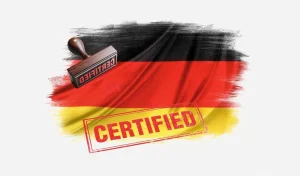In today’s interconnected world, legal translations are crucial in ensuring accurate communication through legal documents across different countries. Hence, certified legal translations play a key role in the facilitation of this communication as discussed in our last blog: Certified Vs Non-Certified Legal Translations This is specifically important when it comes to protecting Intellectual Property (IP) including things like patents, trademarks, and copyrights. Mistakes or misunderstandings in the translation of these documents may lead to serious consequences such as unauthorized usage of someone’s brand or origination.
This blog will explore the significance of legal translations in the protection of intellectual property, the challenges involved, and how businesses can expand internationally by utilizing these.
What is Intellectual Property and Why is it Important?
Intellectual Property (IP) refers to legal rights that protect the property which is the creation of one’s mind such as inventions, logos, names, and other original artistic works. These legal rights help businesses to protect their branding and innovations from unlawful use and infringement.
It has become necessary to protect these rights keeping in mind the expansion of businesses. This, however, is a complex procedure when it comes to ensuring that these rights are internationally protected thus, requiring accurate and precise legal translations.
Types of Documents That Require Legal Translations for Intellectual Property
A few common types of intellectual property legal documents are explained below:
1: Patent
Patent Applications are intellectual property rights applying to inventions. This allows the person to possess the rights to make, use, sell, and license their creation for a limited period. Reciprocal to this, the creator must disclose all the information relating to their innovation in a patent application which is then publicly available.
2: Trademark
A trademark refers to a sign, symbol, logo, word, slogan, or all of them combined which are recognizable to ensure that the products or services of a brand/business can be identified through it and can be differentiated from other businesses. Some examples may include Nike with its slogan being ‘Just Do It’ hence, making it recognizable and easily distinguishable from other businesses. Therefore, these rights allow businesses to protect their identity through logos, slogans, etc.
3: Copyrights
These refer to the legal rights relating to the protection of authorship. This allows the author to possess rights for reproductions, distribution, and adaptation of their work allowing them to maintain control over their work. This allows for their work to not be illegally copied or used without their permission being obtained.
4: Industrial Designs
Industrial designs are the designs of certain products being created in businesses and hence, the protection of these designs through legal rights concerning the shape, colors, and pattern is necessary to avoid imitation which can lead to serious damage to one’s brand identity.
Why are Legal Translations Important for Intellectual Property?
There are various reasons why it is necessary to have legal translations for intellectual property.
These are listed below:
1: Accuracy
Accuracy is vital when it comes to legal translations. Minuscule errors can lead to serious legal consequences which may damage the intellectual property. Legal translations must ensure accuracy to avoid misunderstandings. These translations involve complex legal terminology, specialized language, and navigation through the laws of various countries, hence, they must be translated through professional and certified translators with adequate knowledge and experience in the industry to ensure careful handling of sensitive data.
For instance, if a patent application is not translated accurately, it can lead to ambiguities in addition to the innovation not being conveyed which may lead to duplication without consent causing significant loss to the creator.
2: Compliance with Local and International Laws
Compliance with local and international laws is pivotal as each country has its laws regarding intellectual property rights which vary from one another. A trademark that may qualify for protection under one country’s laws may not qualify in another country.
Hence, translators must have adequate knowledge of both the source and the target country to ensure the documents meet the required legal standards ensuring the protection of these rights as failing to meet these requirements may result in a significant loss of intellectual property rights in that jurisdiction.
3: Preventing Infringement
Accurate legal translations prevent intellectual property rights from being infringed upon by others. Incompetently translated documents lead to misunderstandings and obscurity allowing competitors to duplicate the invention leading to serious legal consequences.
4: Expansion to Global Markets
Businesses need to protect their intellectual property rights as they plan to grow and expand internationally. This is where legal translations play a crucial role in allowing these businesses to protect intellectual property rights in various countries.
Failing to have accurate legal translations can lead to businesses being at risk of losing control over their products and innovations thus, leading to significant damage and loss.
Challenges Involved in Legal Translations of Intellectual Property Documents
Legal translations are complex and hence, encounter various challenges. Some of these challenges may include:
1: Technical Terminology
Intellectual Property documents involve various complex technical terms which may pose a challenge to legal translation. These documents may include complex terms relevant to the products such as scientific terms and hence, legal translators must be proficient in both the legal field along with the particular relevant field to the business to be able to provide accurate legal translations.
2: Differences Involved in Different Legal Systems
Every country has its own set of distinct terminology. Additionally, every legal term may not have its equivalent in another language therefore, a skilled and proficient legal translator is required to ensure an in-depth knowledge of these differences hence, allowing accurate legal translations to be provided thus, avoiding any loss.
3: Cultural Consideration
Cultural differences play a crucial role in accurate legal translations as certain words may have different meanings to different cultures hence, requiring skilled legal translators to avoid misinterpretations.
Conclusion
Legal translations play a pivotal role when we talk about the protection of intellectual property rights as discussed above. Whether you are dealing with patents, trademarks, geographical indications, or industrial designs, the legal documents must be maintained allowing the protection of intellectual property.
We at TransLinguist specialize in providing reliable legal translation services through our certified and trained legal translators with in-depth knowledge of complex legal terminology and adequate industry experience. Contact us for more information about our legal translation services and how we can assist you.



